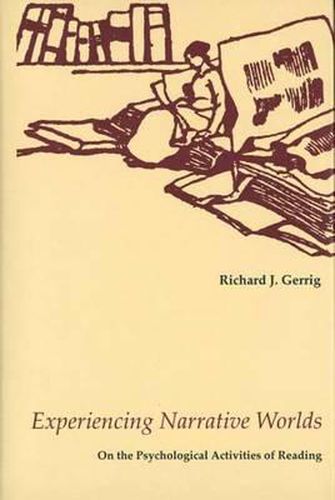Readings Newsletter
Become a Readings Member to make your shopping experience even easier.
Sign in or sign up for free!
You’re not far away from qualifying for FREE standard shipping within Australia
You’ve qualified for FREE standard shipping within Australia
The cart is loading…






What does it mean to be transported by a narrative-to create a world inside one’s head? How do experiences of narrative worlds alter our experience of the real world? In this book Richard Gerrig integrates insights from cognitive psychology and from research in linguistics, philosophy, and literary criticism to provide a cohesive account of what have most often been treated as isolated aspects of narrative experience.
Drawing on examples from Tolstoi to Toni Morrison, Gerrig offers new analyses of some classic problems in the study of narrative. He discusses the ways in which we are cognitively equipped to tackle fictional and nonfictional narratives; how thought and emotion interact when we experience narrative; how narrative information influences judgments in the real world; and the reasons we can feel the same excitement and suspense when we reread a book as when we read it for the first time. Gerrig also explores the ways we enhance the experience of narratives, through finding solutions to textual dilemmas, enjoying irony at the expense of the characters in narrative, and applying a wide range of interpretive techniques to discover meanings concealed by and from authors.
$9.00 standard shipping within Australia
FREE standard shipping within Australia for orders over $100.00
Express & International shipping calculated at checkout
What does it mean to be transported by a narrative-to create a world inside one’s head? How do experiences of narrative worlds alter our experience of the real world? In this book Richard Gerrig integrates insights from cognitive psychology and from research in linguistics, philosophy, and literary criticism to provide a cohesive account of what have most often been treated as isolated aspects of narrative experience.
Drawing on examples from Tolstoi to Toni Morrison, Gerrig offers new analyses of some classic problems in the study of narrative. He discusses the ways in which we are cognitively equipped to tackle fictional and nonfictional narratives; how thought and emotion interact when we experience narrative; how narrative information influences judgments in the real world; and the reasons we can feel the same excitement and suspense when we reread a book as when we read it for the first time. Gerrig also explores the ways we enhance the experience of narratives, through finding solutions to textual dilemmas, enjoying irony at the expense of the characters in narrative, and applying a wide range of interpretive techniques to discover meanings concealed by and from authors.